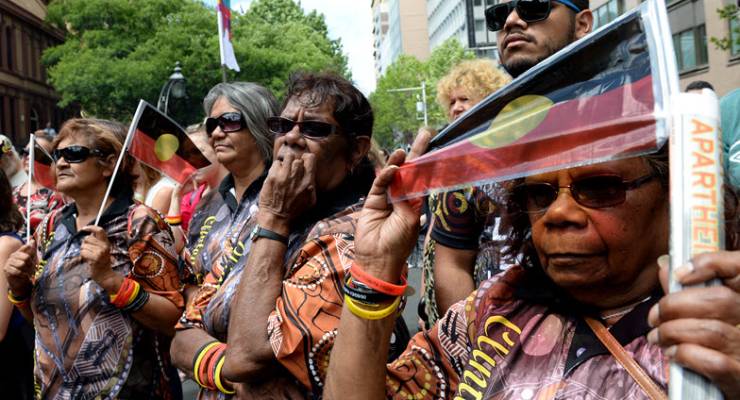
Pressure is mounting on the NSW government to consider further changes to the double jeopardy rule, after the NSW Court of Criminal Appeal yesterday rejected an application to retry a man suspected of murdering three Indigenous children in Bowraville in the early 1990s.
Colleen Walker, Evelyn Greenup and Clinton Speedy-Duroux all disappeared between late 1990 and early 1991. Only Evelyn and Clinton’s bodies were found. In 1994 and 2006, a man who cannot be named for legal reasons was acquitted of their murders.
What is the double jeopardy rule?
The government’s application failed because it was unable to provide the court with sufficient fresh and compelling evidence necessary to overcome the double jeopardy principle — a rule which bars prosecutors from trying somebody who has already been acquitted of an offence.
Double jeopardy is an 800-year-old rule of English common law — the body of legal principles created by past judicial decisions rather than through legislation. A similar rule is enshrined in a number of jurisdictions worldwide, including in the Fifth Amendment to the United States Constitution. The principle has been justified on the grounds that it preserves the finality of judgments, and restricts the ability of the state to engage in malicious prosecutions.
Problems with double jeopardy
This rule becomes harder to justify for cases regarding serious crimes such as murder, especially when new evidence arises over time, and when the earlier prosecution was insufficient. In the Bowraville case, for example, the initial investigations have been widely criticised as lacklustre, and hamstrung by entrenched racial attitudes within the NSW Police Force.
The principle also frequently arouses public outcry in high-profile cases. In 1985, Raymond Carroll had conviction for the murder of baby Deidre Kennedy overturned by the Queensland Court of Criminal Appeal. By 1999, new witness testimonies emerged shredding Carroll’s alibi. Crown prosecutors successfully prosecuted him for the separate charge of perjury, based on false statements he made in his previous trial. But the High Court ultimately quashed the conviction, finding that convicting Carroll of perjury would undermine his previous murder acquittal, and was inconsistent with the double jeopardy principle.
Reforms to double jeopardy
The fallout from the Carroll case saw governments scurry to revisit double jeopardy laws, and in 2006, NSW was the first Australian state to amend the rule. The NSW amendments allowed for a retrial where “fresh and compelling evidence” arose in relation to a “life sentence offence” (such as murder, gang rape, or serious drug offences), or where a trial of a “15 years or more offence” was “tainted”.
A year later, the Coalition of Australian Governments released a proposed model to water down double jeopardy laws based on the fresh and compelling evidence and tainted trial standards. Only ACT and Victoria initially refused to sign the recommendations, however by 2011, all jurisdictions had passed amendments weakening double jeopardy. This is in line with similar developments in the United Kingdom and New Zealand.
Generally, each state allows the exception only for the most serious offences, and where there is fresh and compelling new evidence, or where the earlier prosecution had been tainted. In 2014, Queensland brought its double jeopardy laws in line with other jurisdictions by expanding them to operate retrospectively.
Do the amendments work?
Given the narrowness of the exceptions to double jeopardy, such retrials are very rare, and as such, there is almost no case law explaining what the relevant standards mean. This week’s Court of Appeal’s decision marks the first time such a retrial has been sought in NSW, while earlier this year, Queensland police applied to have a man acquitted of a 1987 murder retried.
Yesterday’s judgment indicated that for the “fresh and compelling” evidence standard to be met, the new evidence must have been unavailable at the time of the earlier trial. Given the paucity of judgments, the court’s decision will have a significant impact on how these laws are applied in future decisions. It may also affect prosecutors’ decisions to push for a retrial in future cases.
Nonetheless, the law remains underdeveloped and unclear. Meanwhile, the Bowraville community remains devastated, and the fight for justice continues.








I have always thought perjury should be a legislation exception to the double jeopardy rule.
Now it basically is (for the serious offences) – it would count as a tainted trial.
In some (most?) other common law jurisdictions it has always been an exception if I recall correctly.
In the US, where double jeopardy is a constitutional thing, I believe things like perjury and perversion of the course of justice (e.g. bribing the jury) have been interpreted as exceptions to double jeopardy because the defendant is not considered to have actually been in jeopardy the first time due to their actions.
That’s an interesting approach.
The rule that the new evidence must have been unavailable at the time of the earlier trial is a good safeguard against a malicious second prosecution. If the prosecutor chose not to use that evidence the first time, there’s no way they deserve a second bite at the cherry.
Law.
Ass.